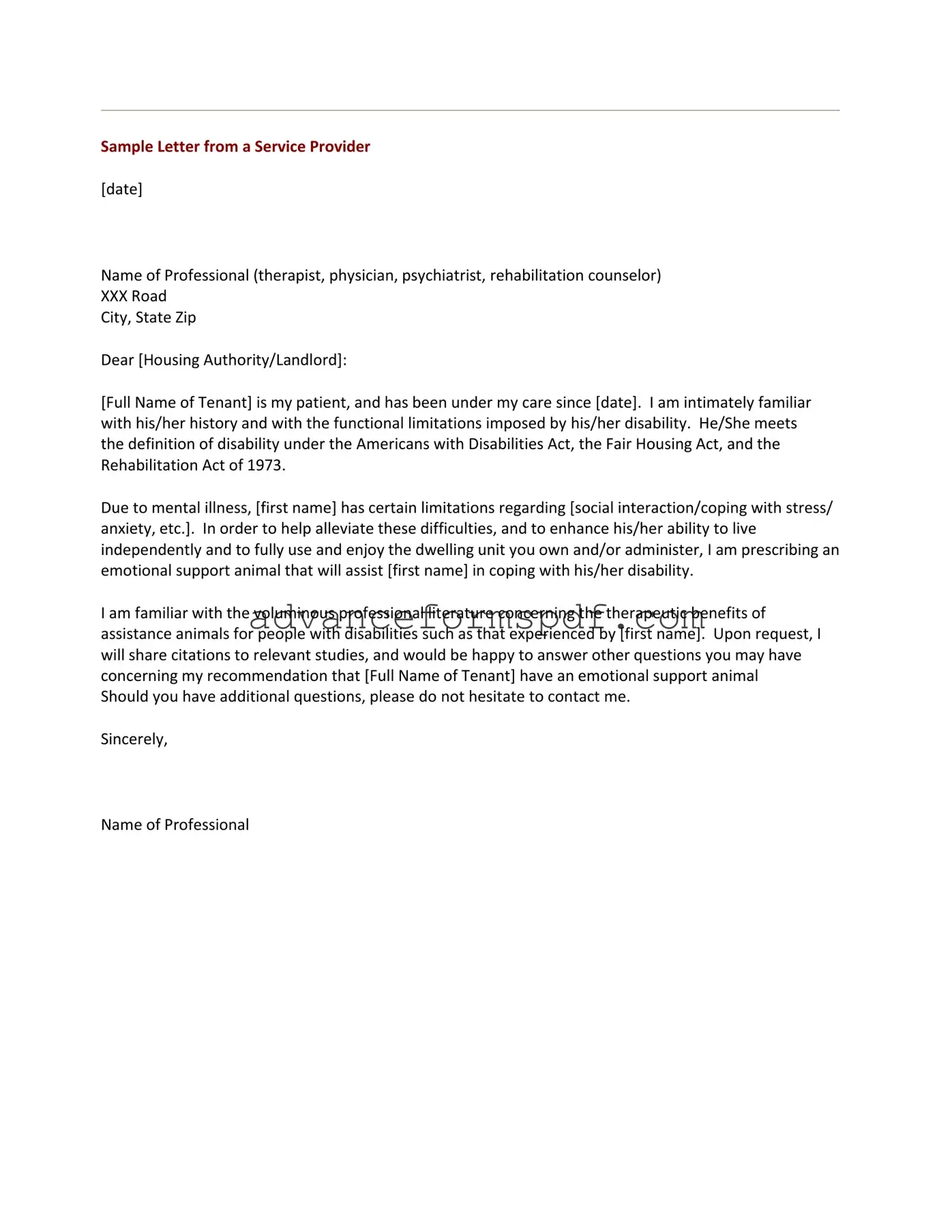Download Emotional Support Animal Letter Form in PDF
For many individuals facing emotional or psychological challenges, the companionship of an animal can provide significant comfort and support. An Emotional Support Animal (ESA) Letter serves as an important document that recognizes this bond. This letter, typically issued by a licensed mental health professional, outlines the need for an emotional support animal as part of a person's treatment plan. It includes essential details such as the mental health professional’s qualifications, the patient’s condition, and the specific ways in which the animal aids in their emotional well-being. This form not only validates the therapeutic role of the animal but also plays a crucial role in ensuring access to housing and travel accommodations that might otherwise restrict the presence of pets. Understanding the components of the ESA Letter is vital for anyone considering this type of support, as it can help navigate the legal landscape surrounding emotional support animals and their rights. Additionally, knowing how to properly obtain and utilize this letter can empower individuals to advocate for their needs effectively.
Document Data
| Fact Name | Description |
|---|---|
| Definition | An Emotional Support Animal (ESA) Letter is a document from a licensed mental health professional that confirms an individual's need for an emotional support animal. |
| Legal Status | Under the Fair Housing Act, individuals with ESAs are allowed to live with their animals in housing that has a no-pets policy. |
| State-Specific Laws | Each state may have specific laws regarding ESAs. For example, California has specific guidelines under the California Civil Code. |
| Provider Requirements | The letter must be signed by a licensed mental health professional, such as a psychologist or psychiatrist, who is familiar with the individual’s mental health needs. |
| Validity Period | ESA letters typically remain valid for one year, after which a new evaluation may be required. |
| Housing and Travel | ESAs are recognized for housing rights, but airlines may have different regulations regarding travel with emotional support animals. |
| Documentation | Individuals may need to provide the ESA letter to landlords or housing authorities to request reasonable accommodations. |
| Limitations | ESAs do not have the same access rights as service animals, which are trained to perform specific tasks for individuals with disabilities. |
How to Write Emotional Support Animal Letter
Filling out the Emotional Support Animal Letter form is an important step for those who need to document their relationship with their support animal. This process ensures that you provide all necessary information clearly and accurately. Follow these steps carefully to complete the form.
- Begin by entering your full name in the designated field.
- Provide your current address, including city, state, and zip code.
- Fill in your contact information, including your phone number and email address.
- Indicate the type of emotional support animal you have.
- Include your animal's name and any relevant identification details.
- Describe your relationship with the animal and how it supports your emotional well-being.
- Sign and date the form at the bottom to confirm the information is accurate.
- Review the completed form for any errors or missing information.
- Submit the form as instructed, whether by mail or electronically.
Once you have completed these steps, you will have successfully filled out the Emotional Support Animal Letter form. Make sure to keep a copy for your records, as it may be needed for future reference.
Emotional Support Animal Letter Example

Sample Letter from a Service Provider
[date]
Name of Professional (therapist, physician, psychiatrist, rehabilitation counselor)
XXXRoad
City, State Zip
Dear [Housing Authority/Landlord]:
[Full Name of Tenant] is my patient, and has been under my care since [date]. I am intimately familiar with his/her history and with the functional limitations imposed by his/her disability. He/She meets the definition of disability under the Americans with Disabilities Act, the Fair Housing Act, and the Rehabilitation Act of 1973.
Due to mental illness, [first name] has certain limitations regarding [social interaction/coping with stress/ anxiety, etc.]. In order to help alleviate these difficulties, and to enhance his/her ability to live independently and to fully use and enjoy the dwelling unit you own and/or administer, I am prescribing an emotional support animal that will assist [first name] in coping with his/her disability.
I am familiar with the voluminous professional literature concerning the therapeutic benefits of assistance animals for people with disabilities such as that experienced by [first name]. Upon request, I will share citations to relevant studies, and would be happy to answer other questions you may have concerning my recommendation that [Full Name of Tenant] have an emotional support animal Should you have additional questions, please do not hesitate to contact me.
Sincerely,
Name of Professional
Common PDF Documents
Employer's Quarterly Federal Tax Return - This form plays a crucial role in ensuring compliance with federal tax laws surrounding employment.
A California Bill of Sale form serves as a written document that outlines the transfer of ownership of personal property from one party to another. This form is crucial for ensuring that the buyer receives clear title and for providing the seller with proof of the transaction. For those looking to obtain this form easily, resources such as Documents PDF Online can be very helpful in navigating property transfers smoothly and securely.
Erc Bma - Defining the broader market area allows for a more nuanced understanding of competition.
